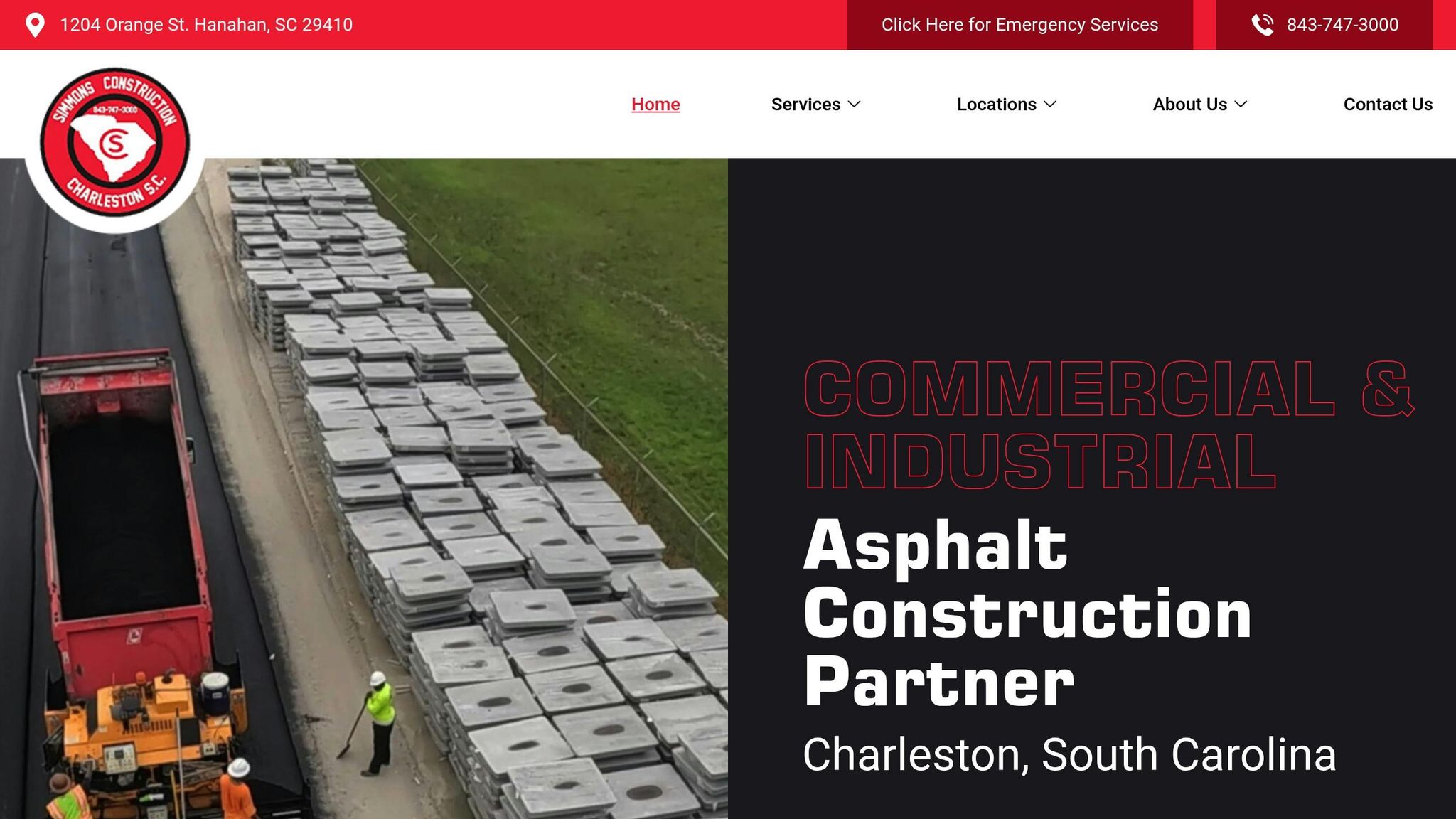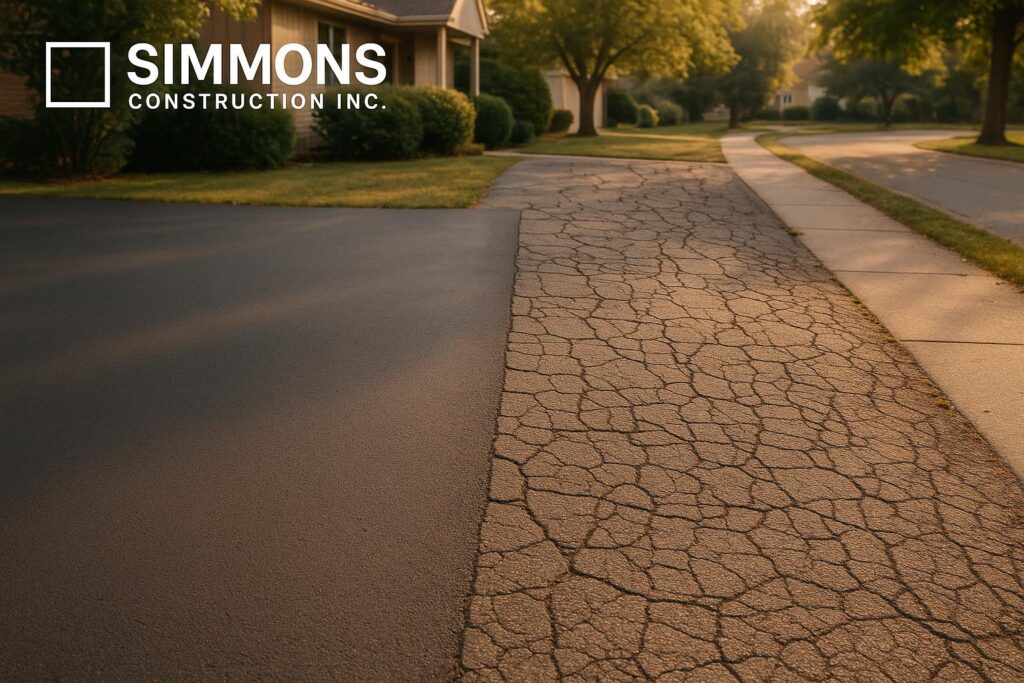When your asphalt shows wear and tear, the decision to resurface or replace depends on its condition, age, and usage. Resurfacing adds a new 1.5–2-inch asphalt layer over the existing base, costing less and causing minimal disruption. However, it only works if the foundation is solid. Replacement involves removing and rebuilding the entire asphalt structure, offering a longer lifespan but requiring more time and money.
Key Factors to Consider:
- Resurfacing: Ideal for minor cracks, faded color, and water pooling. Costs $2.50–$4.00 per sq. ft., lasts 8–12 years, and takes 1–3 days.
- Replacement: Necessary for deep cracks, structural issues, or roads over 15 years old. Costs $4.50–$7.50 per sq. ft., lasts 20–25 years, and takes 5–10 days.
Charleston, SC’s hot, humid climate accelerates asphalt deterioration. Frequent rain, UV exposure, and salt in the air can weaken surfaces, making regular assessments crucial. Businesses should weigh costs, durability, and downtime to choose the best option.
Quick Comparison:
| Factor | Resurfacing | Replacement |
|---|---|---|
| Cost (per sq. ft.) | $2.50–$4.00 | $4.50–$7.50 |
| Lifespan | 8–12 years | 20–25 years |
| Time Required | 1–3 days | 5–10 days |
| Disruption | Minimal | Significant |
For Charleston businesses, consulting experts like Simmons Construction Inc ensures tailored solutions that withstand local weather and traffic demands. Choose wisely to balance cost, longevity, and operational impact.
When Your Asphalt Needs Fixing Up
When the top of your asphalt starts to show marks, but the layer under it is still good, fixing it up is a smart choice. It helps your road last longer without costing too much. Let’s see what signs tell us that fixing up might be needed.
Cracks and Small Holes
See small cracks or tiny holes? These are good for fixing up. Cracks under 0.25 inches and small holes that haven’t gone deep can be fixed before we put on new asphalt. This helps the new layer stick better and look smooth.
But look out for big cracks or lots of cracking. These often mean bigger problems below that might need a complete do-over.
Worn Color and Top Layer
If your once-dark asphalt now looks light and worn, it’s likely the sun has worn it down. This also can make the road weaker over time. Fixing it up can make it look new and protect it again, but only if the bottom layer is still okay.
Small Water Issues
A bit of water gathering is another sign fixing up could work. During the fix, workers can change the slope to help water move better. This matters a lot in rainy places like Charleston. But, if water is getting too deep or making the road shift, it’s better to redo it all.
Road Age: 8-15 Years
For roads used in business, the best time to do fixing up is when they’re between 8 and 15 years old, if the base is still fine. If they’re older or the base is bad, you might need to fix it more deeply or get a new one.
When to Get New Asphalt
As time goes on, asphalt breaks down because air makes it weak. When your road or path is about 15 years old, it might start to crack and break more as it gets weak all through. At this point, small fixes like filling holes or putting a new top layer might not work well. The best choice to make it strong again might be to change all of it. Next, we will talk about how much it costs, how long it lasts, and how long the work takes, so you can pick the right way to fix your asphalt needs for work.
Resurfacing vs. Replacement: Cost, Durability, and Downtime
Once you check your pavement’s state, you should think about the costs, how long it will last, and how much work stoppage each choice – resurfacing or replacing – will bring. Look at early costs, life span, and how much mess your business can deal with. Here’s a clearer view.
Resurfacing is cheap for fixing small surface problems without digging deep. This way puts a 1.5 to 2-inch layer of asphalt on top of the old one. It’s quick and causes less trouble, useful for light damage.
But, full replacement digs deeper and costs more. It takes out all old asphalt, checks and maybe fixes what’s below, and then lays down new stuff. Though more costly at first, this gives a longer use time and fixes big issues deep down.
Time matters a lot. Choosing resurfacing when you need to replace can mean more fixes later, adding to costs. On the flip side, replacing when a resurface would work throws money away. To help you choose, look at this simple table comparing both ways:
Table: Cost, How Long It Lasts, and Work Stoppage
| Factor | Fixing up | Full Change |
|---|---|---|
| Money per sq ft | $2.50 – $4.00 | $4.50 – $7.50 |
| Life Time | 8-12 years | 20-25 years |
| Time Needed | 1-3 days | 5-10 days |
| Work Stop | A bit (part by part) | A lot or too much |
| Needs Dry Weather | So-so | A lot |
| Car Limits | A little | A lot |
When looking at costs, don’t just check the first price. Resurfacing is about half the price of a full change but works for 8-12 years, not as long as the 20-25 years of full change. For busy places, like big car parks, a full change can give more worth over time.
Business downtime is a big thing to think about too. With resurfacing, stores can stay open. Workers can do the job in parts, so other places stay open. But a full change often means shutting the whole area for 5-10 days, which can stop customers from coming in and mess up daily work.
sbb-itb-953c885
Key Points for Commercial Sites in Charleston, SC
When you think of asphalt life in Charleston, SC, it’s not just the price or work stop time. The area’s weather is big in how your road surface lasts. Charleston’s warm, wet weather causes many issues that can make asphalt wear out fast. Knowing how the weather hits your road can lead you to wiser choices about your money spent.
Effects of Local Weather
Charleston’s weather is hard on roads. Summers often reach the 90s°F, and this hot air makes asphalt soft, making it sink under big cars. UV rays also make the road’s glue break down, leading it to crack as time goes on.
Often, storms and high wet air add extra problems. Water goes into small cracks, then makes them big, turning them into holes. The ongoing wet air also makes mold and green stuff grow, which eats the road more.
Being by the sea, Charleston also deals with salt in the air. This salt makes things break down faster and pulls water out of the asphalt, making the cracks worse. Many times, this sort of wear means putting in new road might be better than just fixing the top. Knowing how the weather affects your road can help you pick to fix the top or put in a new one.
How Simmons Construction Inc Deals with Asphalt Work

Simmons Construction Inc has been working in Charleston for 37 years and knows how to help businesses choose to re-cover or replace their asphalt. Their team gets the tough weather; the wet, salty air, and busy roads of the area. This know-how is key in their promise to give pavement fixes that work well for commercial spots.
"Our asphalt paving services in Charleston are designed to withstand Charleston’s humid subtropical climate. We offer precision milling to remove old, damaged asphalt and paving for a smooth, durable surface."
- Simmons Construction Inc
Full Asphalt Check Services
Simmons Construction Inc starts each work with a deep look at your road cover. Their team of project heads checks every bit – finding cracks, holes, top layer wear, and testing the solid base under it. They look over water paths too, to make sure water runs right. This careful check lets them give you smart, wallet-friendly fixes made just for Charleston’s needs.
"Our team will assess the condition of your pavement, identify cracks, potholes and surface wear and provide professional repair and preventative maintenance services."
- Simmons Construction Inc
Fixing and Changing Skills
If your job needs fixing up or a new start, Simmons Construction Inc mixes good cost with long-life use. They use top gear and ways to give top-notch work. They do careful cutting to take off bad asphalt, fix the base if needed, and put in new tops ready for Charleston’s weather and busy roads.
The company has done many big job types, like hospitals and clinics that need tough tops for lots of cars and ambulance needs, storage centers that must have strong ground for big trucks, and shop areas where much-used spots like doors and cart areas are made good again.
Their big job license CLG114705 lets them take on jobs up to $750,000, from small car park fixes to big industrial makeovers. For bigger places, they can change car spaces, put in water systems, and make lines and signs clearer for better use.
Fast Fixes and Steady Upkeep
Sudden asphalt troubles can mess up how things run, so Simmons Construction Inc has a ready all-day help team for quick fixes.
"We are Available 24/7 for Emergency Response"
- Simmons Construction Inc
Not just in urgent cases, they stress keeping things up to date. They offer everyday sealing to guard against sun, water, and oil harm, and they also make unique upkeep plans just for your property’s special needs. Each job comes with a promise of full happiness, and their group sticks to tough safety rules on-site.
For business clients with big plans, Simmons Construction Inc suggests getting at least three full bids to make smart choices. With almost forty years of area know-how, they set real times and aid firms in cutting down on pauses while they plan improvements or fixes.
Conclusion: Picking the Best Option for Your Asphalt
When choosing to fix or replace asphalt, it’s key to see what your road tells you. If you see light cracks, tiny holes, or the color is off, a fix might work. Yet, if the cracks are deep, holes are big, water stays, or the road bends or dips, you might need to replace it all. Age matters too – roads 8 to 15 years old can often just get fixed, but those over 15 years might need full replacing.
It’s also good to know that an expert can find hidden base issues that aren’t easy to spot right away. A thorough check goes past the top damage, looking at the road’s base, how water runs off, and how strong it is. This makes sure the fix you pick not only sorts out the now, but also fits what you need later and fits your money plans.
In places like Charleston, with its damp weather, lots of cars, and certain rules, getting advice from an expert is even more key. Pros can help deal with the coast’s weather to keep your asphalt strong and right by the rules.
All in, whether you go for a fix or a full change, the choice you make now will touch how well your property works and its worth for a long time. Using pro advice helps you make a wise, money-smart pick that lasts.
FAQs
How can I tell if my asphalt needs to be completely replaced instead of resurfaced?
If more than 25% of your asphalt surface is damaged – whether it’s riddled with deep cracks, large potholes, or sunken areas – it’s probably time to consider a full replacement. This is especially important if the asphalt is over 20 years old or has noticeable wear and tear that can’t be ignored.
Another key factor is the condition of the foundation beneath the asphalt. If it’s weakened or shows signs of serious structural failure, resurfacing won’t cut it. In such cases, replacing the asphalt is the better choice to ensure a stronger, longer-lasting surface.
How does Charleston’s climate influence whether to resurface or replace asphalt?
Charleston’s humid subtropical climate brings frequent storms, high humidity, and heavy rainfall – all of which can wreak havoc on asphalt surfaces. When moisture seeps into small cracks, it weakens the structure from within, speeding up wear and tear. Over time, this can result in major issues like potholes and poor drainage.
In cases where the asphalt is severely damaged, a full replacement might be the only way to fix deep structural problems. On the other hand, for less extensive damage, resurfacing can be a practical way to prolong the life of the pavement. Evaluating the level of wear and factoring in the local climate is essential to choosing a solution that’s both durable and cost-effective.
How can I determine whether resurfacing or replacing my asphalt is more cost-effective in the long run?
When deciding whether to resurface or replace asphalt, it’s essential to weigh both upfront costs and long-term expenses. Resurfacing tends to be the less expensive option initially, though it might lead to more frequent maintenance down the road. In contrast, replacing asphalt requires a larger initial investment but often results in a surface that lasts longer and reduces future repair needs.
You’ll also want to evaluate the severity of the damage. Resurfacing works best for minor issues like cracks or shallow potholes. But if the asphalt has significant structural damage or drainage problems, replacement could be the smarter choice. While it costs more upfront, replacement tackles the root causes of damage, offering better durability over time.
By carefully considering these factors, you can choose the option that best fits your budget and ensures the longevity of your asphalt surface.


